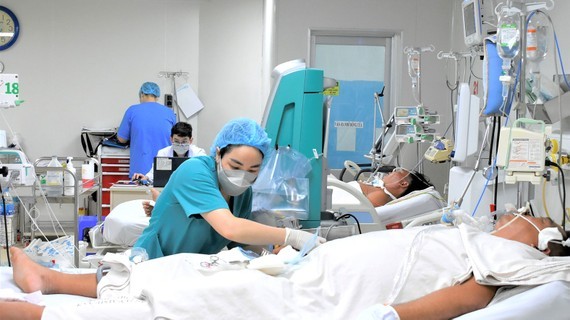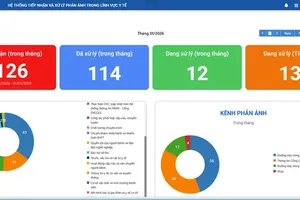 Joint circular impedes recruitment of medical workers resulting in shortage of nurses
Joint circular impedes recruitment of medical workers resulting in shortage of nurses
According to the Department of Health of Ho Chi Minh City, the ratio of nurses, and midwives to doctors in the city's public hospitals is 1.86, and more than 55 percent of the total clinical departments have a ratio of nurses to doctors below 2 meanwhile, for good care of patients, the satisfactory rate must be three nurses, midwives per doctor.
Associate Professor Tang Chi Thuong, Director of the Department of Health said that the shortage of human resources for nurses, midwives, and medical technicians is a very worrying situation. Worse, over the past year, more and more experienced medical workers have quit or quit their jobs at public hospitals with a number to over 2,000 people whereas recruitment of new medical staff has been quite difficult.
It is alarming that the enrollment rate of nursing and midwifery majors in health schools has also decreased sharply. For example, around 2,300 candidates enrolled in the faculty of nursing and midwifery at Pham Ngoc Thach University of Medicine in 2021 but in 2022 there were only nearly 800 candidates applying for admission.
Elsewhere in the city, the Faculty of Medicine belonging to the Vietnam National University Ho Chi Minh City has an enrolment quota of 200 candidates for nursing, but applicants into the school currently have nearly 60 percent of the quota. In other colleges and intermediate schools with training in health, some of them could recruit 20 percent of the target while well-known schools can achieve over 60 percent of the target by the end of September 2022.
Principal of Dai Viet Saigon College Le Lam disclosed that the country has 193 universities, colleges and secondary schools training health majors, and the number of graduates in nursing, midwifery, and medical technology is over 10,000 people.
In addition, thousands of Vietnamese nurses and midwives have gone to many other oversea countries for working but domestic public hospitals cannot recruit them. According to Dr. Le Lam, the poor facilities and treatment regime are the culprit of the problem.
Vice Chairman of the Ho Chi Minh City Vocational Education Association Tran Anh Tuan pointed out the joint circular 26/2015 of the Ministry of Health and the Ministry of Home Affairs on codes and standards for nursing, midwifery, and medical technology is the main reason why students give up. Because according to this circular, from January 1, 2021, only graduates from colleges or higher education institutes can be recruited to become public employees as nursing, midwifery, or medical technician in infirmaries.
Colleges and intermediate schools that are training the above three majors at the intermediate level are heavily affected on enrollment. Last but not least, many medical staff with intermediate qualifications rushed to attend college to standardize their qualifications according to the requirements of the circular. Without a timely and comprehensive solution, especially to amend or remove Circular 26/2015/TTLT-BYT-BNV because it is not suitable with reality, the personnel problem for the health sector will still be more serious, said Mr. Tran Anh Tuan.
Nurse Bui Thi Hong Ngoc, Head of the Nursing Department of the Ho Chi Minh City-based Hospital for Tropical Diseases, said that the Hospital's Emergency Department and Adult Resuscitation - Anti-Poisoning Area alone has seen a serious shortage of nurses. She added that 4-6 nurses work in a shift but some days, they have to take care of 30 seriously ill patients.
According to her, it's time to fully acknowledge the role and function of nurses and midwives in people's health care; based on that, proper mechanisms and policies should be adopted to support, attract and retain nurses with higher salaries which can make nurses and midwives feel ensure to work and high school graduates will choose nursing as their major.
Nurse Nguyen Thi Bich Hong, Chief Nursing Officer of Pham Ngoc Thach Hospital, also informed that the hospital's Department of Active Resuscitation - Anti-poisoning operated at full or overloaded capacity with 66 beds. As a special department, the work pressure is great while medical workers are at risk of being infected with lung diseases but the 60 nurses of the department must work relentlessly for emergency and resuscitation work with little time for relaxing. Some nurses who have worked for more than 10 years under extreme pressure at the department are unable to further stand the pressure, they had no choice but to quit their jobs.
In the face of the shortage of nursing and medical technicians due to retirement or quitting jobs, the Department of Health has proposed to the municipal People's Committee to provide additional income according to the Resolution No. 03/2018 of the People’s Council for all nurses, midwives, and medical technicians currently working in public hospitals, including those working on professional contracts. At the same time, the department proposed the People's Committee of Ho Chi Minh City submit a written request to the Ministry of Health to extend the time allowed to recruit nurses, midwives and intermediate medical technicians until January 1, 2026, and extend the standardization of college degree for those who have been recruited at the intermediate level until December 31, 2030.
According to Dr. Tran Van Khanh, Director of Le Van Thinh Hospital in Thu Duc City, this is an open direction, to help hospitals partly solve the shortage of human resources. In fact, the hospital currently only needs 30 percent-40 percent of nurses and midwives with college and university degrees to do management work. The rest mainly take care of the sick, so they don't need high qualifications.
























